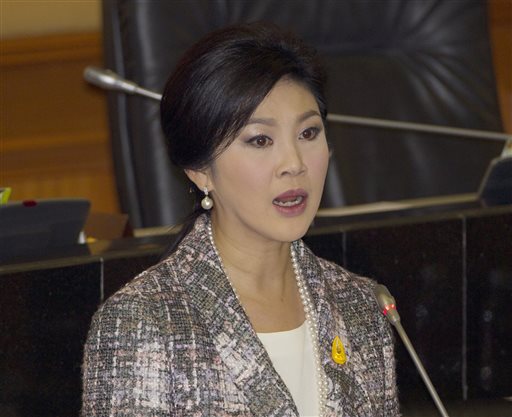
Thailand’s former Prime Minister Yingluck Shinawatra answers a question at parliament in Bangkok, Thailand Thursday, Jan. 22, 2015. AP
BANGKOK–Thailand’s military-appointed legislature on Friday voted to impeach former Prime Minister Yingluck Shinawatra for her role in overseeing a government rice subsidy program that lost billions of dollars, a move that could further polarize a divided nation plagued by political turmoil and coups for a decade.
The vote, which means Yingluck will be banned from politics for five years, came just after the attorney general’s office announced separate plans to indict her on criminal charges for negligence related to losses and alleged corruption in the rice program.
No date has been set for the formal indictment, but if convicted, Yingluck could face 10 years in jail.
Yingluck’s supporters see the moves as part of an effort to deal a final blow to her political party after the military seized power in a coup in May, overthrowing a government elected by popular vote in 2011.
Impeachment required a three-fifths vote of the legislature’s 220 members, and on Friday 190 voted against Yingluck. Most members of the legislature are part of the military or political opponents of Yingluck and past governments allied with her brother, former Prime Minister Thaksin Shinawatra, who was ousted in a 2006 coup.
Yingluck did not immediately comment, but in an appearance before Parliament on Thursday, she denied she was responsible for any corruption and questioned the fairness of an investigation by the anti-corruption commission, which had recommended she be charged.
“The rice subsidy scheme was run by groups of people. It was a resolution of the Cabinet … why am I singled out?” Yingluck asked. “To bring the case against me alone, therefore, shows a hidden agenda under an unjust practice, and is a political agenda.”
She also said the anti-corruption commission lacked the legitimacy to judge her because the junta terminated the constitution when it took power on May 22.
National Anti-Corruption Commissioner Wicha Mahakhun told lawmakers Thursday that Yingluck was to blame. “Despite the warnings against it on several occasions, the prime minister, who should have stopped the damage, instead insisted on running the program until the damage became even more devastating.”
The rice subsidy program, which paid farmers double the market price for their crops, ultimately incurred national losses of more than $4 billion and temporarily cost Thailand’s place as the world’s leading exporter.
Supporters say the program was intended to benefit Thai farmers and reduce the income equality gap in the country. The policy had helped Yingluck’s government win power in 2011.
Surasak Threerattrakul, director general of the attorney general’s Department of Investigation, said Friday that Yingluck will also face criminal charges for negligence of duty as a state official overseeing the program.
Surasak told reporters at a news conference in Bangkok that the attorney general had examined evidence and testimony against Yingluck “and found that the case was complete enough to prosecute.”
RELATED STORIES
Court dismisses Thai PM Yingluck Shinawatra from office
Thailand to begin impeachment hearing of ousted PM